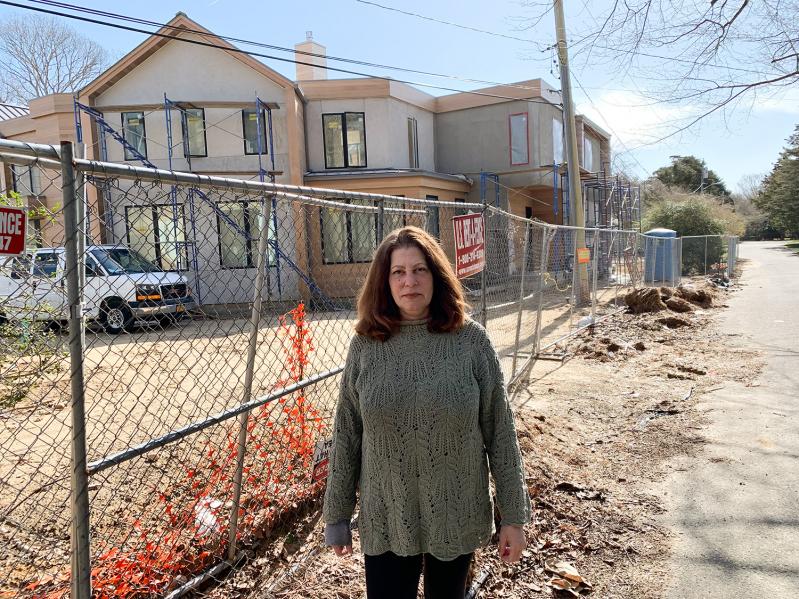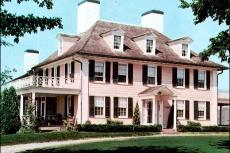The political scientist Erica Chenoweth has observed that political change happens when 3.5 percent of the population actively participates in protests demanding that change.
How and whether that applies to East Hampton Town is less certain, but Jaine Mehring of Amagansett’s Beach Hampton neighborhood is on a quest to focus attention on the wave of development and redevelopment that is transforming neighborhoods and is characterized by building to the maximum allowable size and lot coverage.
Ms. Mehring is the founder of Build.In.Kind/East Hampton, the mission of which is to “help restore rational restraint and inspire desire for more modulated proportions in order to mitigate the negative impact of development activity in our town,” according to its website. She will discuss this objective Friday at 7 p.m. at Scoville Hall in Amagansett with the journalist Biddle Duke and Jolie Parcher of Mandala Yoga Center for Healing Arts. The discussion is part of the Mandala Community Voices series.
“A lot of people have been outraged for a very long time at the pace and scale of development out here,” Mr. Duke said, “at the gross excess at a time when the world is screaming in existential pain for us to live smaller in every way, at the erosion of the sense of community and neighborhood character, at the downing of ancient trees and landmark buildings. Finally, someone is saying ‘enough!’ Through a combination of outrage, angst, and hard work and study, Jaine Mehring is building a powerful community spotlight on the inadequacy of our zoning and building regulations to preserve everything that makes this a fine place to live.”
A Queens native, Ms. Mehring brings a unique skill set to Build.In.Kind. As an equity research analyst on Wall Street, “I built models and spreadsheets, and thought about long-term, complex industries and systems, and how the pieces fit. That’s why I don’t see the issue of development here as an individual issue in a vacuum. I see it as the root cause of a complex of systems.” Later, she managed research and human capital departments, “which helps me with the engagement with all types of people and kinds of decisions and points of view.”
In the 1960s, “even though we never had money,” Ms. Mehring said, her parents “would scrape some dough together in the summer and we’d go out to Montauk,” staying at places including the Ronjo Resort Motel (now the Montauk Beach House) and Gurney’s Inn (now Gurney’s Montauk Resort and Seawater Spa). “It’s all very vivid,” she said of memories of the era.
“My high school boyfriend’s parents had bought a little tiny home on Treasure Island Drive in Beach Hampton, and they would come out here for the summer, so I got to come out and visit. That’s really how I fell in love with Beach Hampton.” For a time, she rented. “I had been working really hard and banking some of my bonuses and stuff like that,” she said. “I worked on Wall Street, which was good to me, but I was a fish out of water there.” In 2002, she bought a house in Beach Hampton, spending time there throughout the year, particularly after founding a consulting business. She became a full-time resident in 2019.
“Once I was really out here full time — and I have a dog, we go everywhere — I was seeing this stuff, and was kind of overwhelmed by it.” In 2020, during the Covid-19 pandemic, “I started doing research,” listening to elected and appointed board meetings, reading the zoning code, “just paying a lot of attention, and got into this realm of seeing what was happening. I started following the real estate trends, the ads, all that kind of stuff.”
She joined the Amagansett Citizens Advisory Committee, and Build.In.Kind was born soon afterward “to engage the community, get them involved, harness their own discomfort” over development trends, “and create a voice that would then go to the [town] board to ask for change. The second part is, I am advocating pretty strongly and directly for changes to the zoning code and the things that go with it.”
Large houses and wealthy part-time residents are hardly a new phenomenon on the South Fork. Late-19th-century issues of The Star are rife with accounts of summer-colony “cottages” under construction and captains of industry vacationing here. But in the last several years in particular, “globally we are at a level of wealth concentration that is unprecedented, and it is beyond comprehension, in a way,” Ms. Mehring said. “And where we live is one of the ‘parking grounds’ for that. That’s number one.”
“Number two is the incursion and the rise of the speculative building activity that is in large part funded by those monies. Again, there’s always been speculative real estate, but it’s at such a size and such a level, and now we have these consortiums of money that — we don’t even know, there’s not a lot of visibility or transparency. But I believe it’s the rise of the speculators that has made the big change.”
The zoning code is complicated, Ms. Mehring allows, but its formulas, based on a parcel’s size, determine the allowable size of dwelling and accessory structures, and maximum overall lot coverage. Until recently, “no one built to those maximums,” she said. “No one really thought that the code was a problem, because everyone was staying mostly well below what’s ‘allowable.’ Now, because it’s so much speculative money, they want to maximize the amount of money that they extract, and maximally shorten the amount of time in which they extract it. To do that is to build to the absolute maximum allowable, and sometimes they’re trying to go over. I think that has brought this to a frenzy and a level that has never been seen before.”
Ms. Mehring is a regular in The Star’s letters pages, and she often addresses the town board about development as well as affordable housing, coastal resiliency, and beach access. “But I generally tie it back to the issue of overdevelopment, because I think that we won’t fix those things until we get, I’m going to call it a ‘rebalancing’ of land use, via the code.”
In September, Jeremy Samuelson, the town planning director, was quoted in a New York Times article about a six-bedroom house under construction at Ditch Plain Beach in Montauk that has angered neighbors and beachgoers but is in compliance with the zoning code. “He sort of opened the door around saying, ‘Maybe we should change the code,’ “ Ms. Mehring said. “And then [Supervisor] Peter [Van Scoyoc] made a similar comment in The Star. Needless to say, that was music to my ears.”
Revising the zoning code would represent “a big amount of work, and a serious process, to get it structured correctly and legally,” she said, predicting an onslaught of protest by builders and real estate brokers, “and they’re more global than ever, they’re more well-funded than ever. It’s painful, and that comes back to why I’m trying to get people to step up in front of the board, because they actually <I>need<P> the public outcry.”
At tomorrow’s event, “I want to hear what people have to say,” she said, “and then help them. I’m not there to put words in people’s mouth or tell them what to think. I want to hear what they’re thinking, and then help them shape what their concerns are into actual action steps that they can take to engage.”
Admission to tomorrow’s discussion is free, but those planning to attend have been asked to register on the Mandala website.




